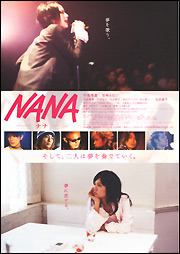
Weeaboo Wednesday: NANA
July 15, 2009
This column was written on July 8th and initially published that day. Upon hitting the “Publish” button, I saw that Kyle had already written one. Because it was Kyle’s week to write a WW, and I had forgotten. So I took it off the site and decided to publish it the next week. Except that would have been yesterday, and yesterday I forgot. Fortunately there’s this thing where you can fiddle with the date that an entry appears to be filed under. This column was retro-published on the site on Thursday the 16th. Look, it’s not like these are particularly time-sensitive, OKAY?
So apparently Ai Yazawa, creator of some of my all-time favorite shoujo manga, is very sick and won’t be updating Nana for a while. Given this tragic and unverifiable news I sort of remember reading on onemanga.com, I thought it might be a good opportunity to put Ai Yazawa on trial for bringing out the worst in the Japanese– and in doing so, introduce you gaijin to the absolutely fascinating, somewhat nauseating phenomenon that is Nana.

The Claim:
Ai Yazawa has brought out the worst in the Japanese people
After enjoying moderate success with earlier manga, such as Gokinjo Monogatari and Paradise Kiss (both got made into animated series), Ai Yazawa really hit it big with Nana, which she started writing in 2000, and is still writing today. Nana got made into a fairly high quality anime series (so far, one season with 42 episodes), as well as two live action movies.

Nana (top), Nana (bottom)
The gimmick of the series is that there are two girls both named Nana– one very cool and very career-oriented, and the other very silly and with few aspirations in life– who become friends. It’s not a particularly great gimmick, and the success of the series mostly relies on the fake bands it created.
The cool Nana is the lead singer of a Sex Pistolsesque punk band (Black Stones) in an intense rivalry with a more mainstream-friendly J-rock band (Trapnest). Incidentally, Trapnest’s guitarist was once the Black Stones’ bassist, and is also Nana’s longtime lover.
Exhibit 1:
The Live Action Films
The celebrity personalities made up by Ai Yazawa launched the musical careers of two actresses in the live action films– the two playing the respective lead singers of the Black Stones and Trapnest. Mika Nakashima’s “Glamorous Sky” hit number 1 on the Oricon charts, and Yuna Ito’s “Endless Story” hit number 2.
Actresses.
Exhibit 2:
The Anime Series
It wasn’t just the actresses from the live action films who played at being Nana and Reira, two other musicians were hired to sing songs for the anime series. And have been holding weird anime theme song street concerts ever since.
Anime versions:
Granted, these singers haven’t profited quite as much as Mika Nakashima and Yuna Ito have, but still:
For fuck’s sake.
Counterpoint:
Of course, fake bands aren’t new to the West. The classic example would be Spinal Tap, a more recent instance is Dethklok.
Even the Gorillaz, much more musically successful than the former two, count as a fake band. None of the band members actually exist in real life, are occasionally “played” by different people, and even have an elaborate fake mythology.
Conclusion:
But in the end, if you think about what Spinal Tap, Dethklok, and the Gorillaz all have in common with each other, you will swiftly come to the conclusion that Nana definitely doesn’t have it.
Nothing about Nana is tongue-in-cheek. Whereas Spinal Tap and Dethklok given an absurd take on metal music, and the Gorillaz gracefully mock motifs from many different genres, Nana is a totally straight-faced tribute to the Sex Pistols, from the Vivenne Westwood outfits, right down to the weird relationship between Nana and Ren that, at one point, hinted at a Sid/Nancy ending to the manga. And just like Nana is a straight-faced tribute to the Sex Pistols, the music of Mika Nakashima/Yuna Ito/Anna Tsuchiya/Olivia is a completely straight-faced tribute to a fucking girly comic book.
If Ai Yazawa brought out anything weird in the Japanese, she brought out the horrifying seriousness with which they approach everything. Which, I guess, is nothing new. You can’t expect a nation, whose idea of humor centers around creative animal abuse and the proliferation of puns, to grasp the subtlety of “But this one goes to eleven.”
In conclusion,
The bigger the cushion, the sweeter the pushin’
That’s what I said
The looser the waistband, the deeper the quicksand
Or so I have read
My baby fits me like a flesh tuxedo
I’d like to sink her with my pink torpedo
Big bottom, big bottom
Talk about bum cakes, my girl’s got ’em
Big bottom drive me out of my mind
How could I leave this behind?
I met her on Monday, ’twas my lucky bun day
You know what I mean
I love her each weekday, each velvety cheek day
You know what I mean
My love gun’s loaded and she’s in my sights
Big game is waiting there inside her tights, yeah
Leave a comment